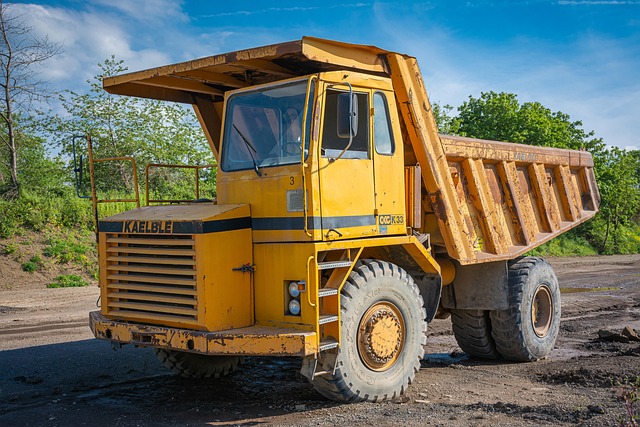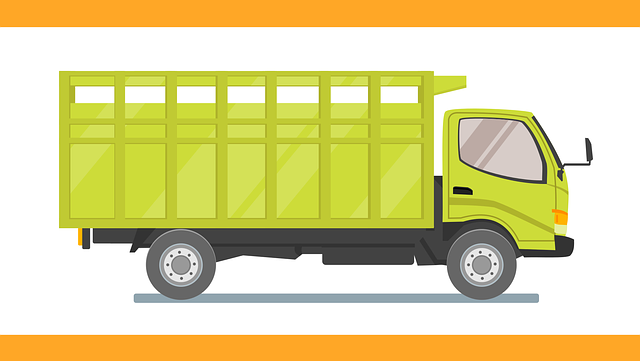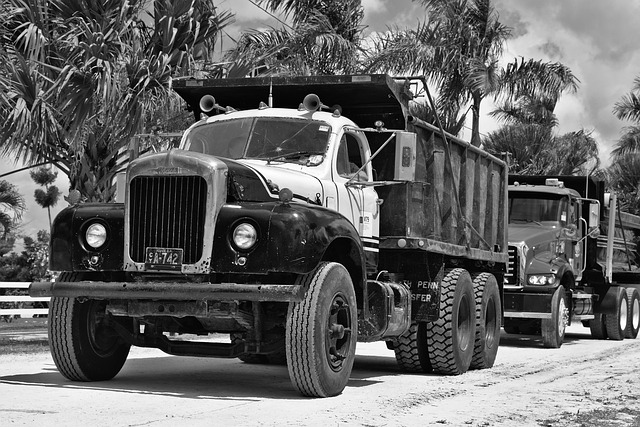Dump truck operators and businesses must prioritize dump truck liability insurance as a critical safety measure to protect against financial losses from accidents, property damage, or injuries. This coverage shields them from substantial legal fees and third-party losses, particularly in high-risk sectors like construction, mining, and waste management. Key aspects include understanding policy scopes, recognizing exclusions (like wear and tear), choosing suitable limits, and implementing robust risk management strategies to maximize protection while avoiding unnecessary costs.
In the fast-paced world of heavy-duty operations, ensuring comprehensive coverage is paramount, especially with dump trucks. This article delves into the intricacies of dump truck liability insurance, a vital shield for various industries. We explore the essential coverage basics and uncover types of operations demanding full insurance. Furthermore, we analyze key policy components, potential limitations, and effective risk management strategies to optimize protection. Understanding these aspects is crucial for businesses navigating the complexities of dump truck operations and associated liabilities.
- Understanding Dump Truck Liability Insurance: Coverage Basics
- Types of Operations Requiring Full Dump Truck Insurance
- Key Components and Limitations of Dump Truck Liability Policies
- Risk Management Strategies for Optimal Dump Truck Insurance Protection
Understanding Dump Truck Liability Insurance: Coverage Basics

Dump truck operators and businesses involved in various operations need to be aware of the potential risks and liabilities associated with their work. This is where dump truck liability insurance steps in as a crucial safety net. It provides financial protection against claims arising from accidents, damage to property, or injuries sustained by others due to the operation of a dump truck.
The coverage basics typically include compensation for medical expenses, legal fees, and damages for third-party losses. This type of insurance is essential as it shields operators from significant financial burdens resulting from lawsuits or incidents that may occur during hauling, unloading, or even while the vehicle is parked. Understanding the scope of this insurance is vital for ensuring adequate protection throughout different construction, mining, or transportation projects.
Types of Operations Requiring Full Dump Truck Insurance

In the realm of heavy-duty machinery, dump trucks play a pivotal role in various operations, from construction sites to mining projects and waste management. Due to their size and potential for high-impact scenarios, operating a dump truck comes with unique risks that necessitate comprehensive insurance coverage—specifically, full dump truck liability insurance. This type of insurance is crucial for protecting businesses and drivers against significant financial losses resulting from accidents or incidents involving these powerful vehicles.
Full dump truck insurance covers a wide range of operations, including road construction, where the frequent movement of large vehicles increases the risk of collisions; material hauling for industries like mining and agriculture, where the transport of heavy loads requires specialized coverage; and waste management services, which deal with hazardous materials and require robust liability protection. By ensuring adequate dump truck liability insurance, businesses can navigate these operations with peace of mind, knowing they are shielded from potential legal and financial repercussions.
Key Components and Limitations of Dump Truck Liability Policies

Dump truck operators must understand that their vehicles, due to their size and nature of operation, come with inherent risks. A full dump truck insurance policy covering liability is therefore essential for protecting businesses from potential financial ruin in case of accidents or damages caused during operations. Key components of these policies typically include coverage for property damage, bodily injury to third parties, and legal fees associated with defense against claims.
However, these policies also have limitations. For instance, they usually exclude coverage for wear and tear to the truck itself, or damage caused by environmental factors like weather. Additionally, the level of liability coverage can vary greatly between policies, with higher limits providing more protection but at a potentially higher cost. Businesses should carefully review their policy details, understanding both the comprehensive benefits and specific exclusions before selecting the most suitable dump truck liability insurance for their operations.
Risk Management Strategies for Optimal Dump Truck Insurance Protection

Risk management is an integral part of any successful operation, and when it comes to dump truck insurance, it’s no different. By implementing robust strategies, businesses can navigate the challenges associated with this specialized form of liability insurance. One key approach is to conduct thorough risk assessments to identify potential hazards specific to each project or operation. This includes evaluating the type of material being transported, the terrain and weather conditions, and any site-specific regulations that may impact safety.
Additionally, developing comprehensive safety protocols and training programs for drivers can significantly reduce risks on the road. Regular maintenance checks on dump trucks ensure optimal performance and minimize mechanical failures. Effective communication between all stakeholders involved in the project ensures a cohesive approach to risk management. This collaborative effort fosters a culture of safety, enabling businesses to make informed decisions regarding insurance coverage, ultimately leading to better protection for their investments.
Dump truck operators must meticulously manage risks associated with their operations due to the high potential for significant damage and liability. Understanding the nuances of dump truck liability insurance, including its coverage basics, operational requirements, and limitations, is crucial for protecting businesses and drivers alike. By implementing effective risk management strategies, such as regular vehicle maintenance, driver training, and adherence to safety protocols, operators can navigate the complexities of this specialized insurance landscape with confidence, ensuring they are adequately protected against potential losses. Investing in comprehensive dump truck liability insurance is a vital step towards minimizing financial exposure and fostering a safe working environment.
